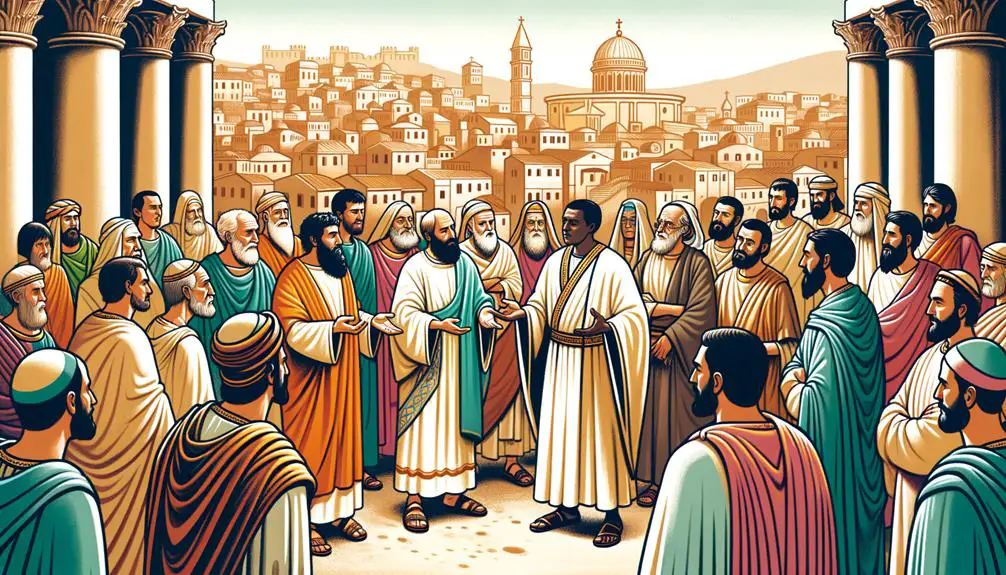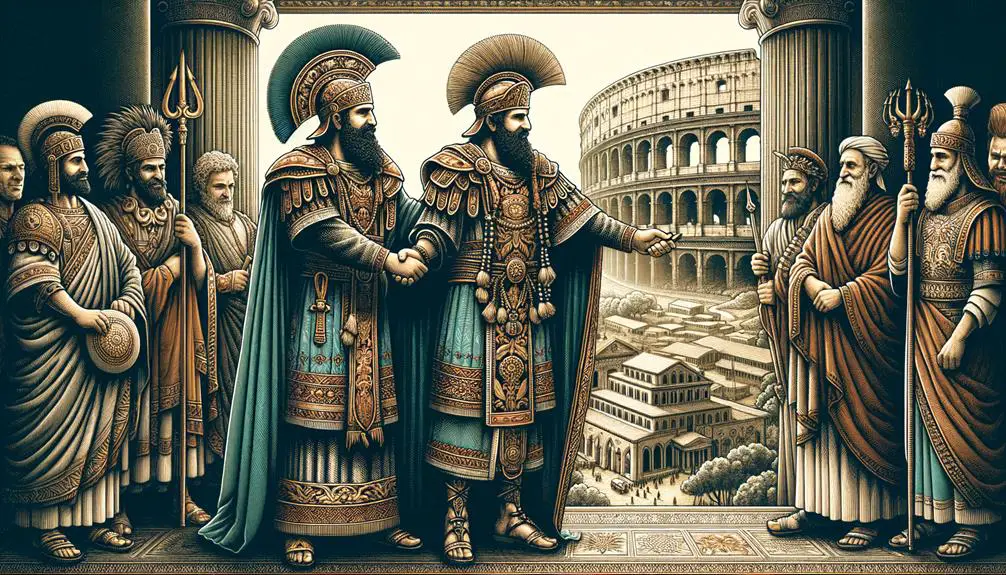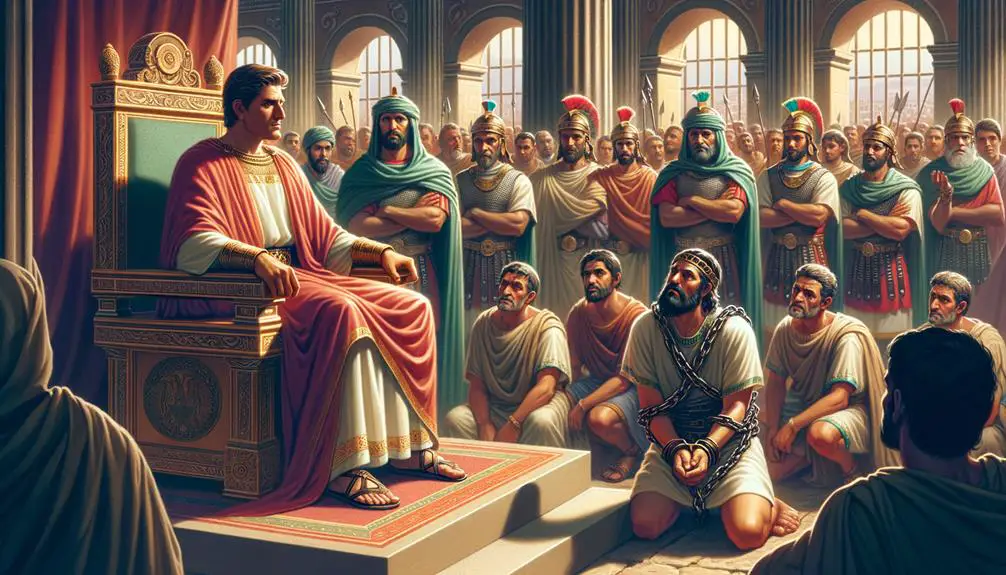Traverse the complex legacy of King Agrippa, a biblical monarch who navigated the crossroads of Jewish tradition and Roman allegiance.

Who Was King Agrippa in the Bible
Just as a coin has two sides, so does the story of King Agrippa in the Bible offer a complex portrait of a ruler caught between loyalty to Rome and the traditions of his Jewish subjects. You might know him from his encounter with Paul the Apostle, a pivotal moment that showcases his diplomatic finesse and the intricacies of his reign.
Yet, there's much more beneath the surface of this historical figure. By exploring his early life, ascent to power, and the delicate balance he maintained between his heritage and the Roman Empire, you'll uncover a narrative rich with political intrigue and personal dilemma.
This journey into King Agrippa's world promises to illuminate not only his impact on Judaism and the early Christian church but also the enduring legacy of his leadership.
Key Takeaways
- King Agrippa was a Judean monarch with a rich Herodian heritage, ruling from AD 41 to 44.
- He fostered strategic alliances with Roman nobility and prioritized temple renovations to maintain Judea's identity.
- His reign involved navigating administrative challenges, promoting religious tolerance, and supporting economic prosperity in Judea.
- Agrippa had a significant encounter with Paul, influencing early Christianity and leaving a lasting legacy through archaeological evidence of his reign.
The Historical Context

To fully grasp King Agrippa's significance, it's crucial to delve into the complex socio-political landscape of Judea during the 1st century CE, a period marked by Roman rule and Jewish resistance. King Agrippa, also known as Herod Agrippa, played a pivotal role during this era, not only due to his political maneuvering but also because of his genealogical background and architectural contributions, which were significant in shaping the region's identity and its relationship with the Roman Empire.
His genealogical background, being a descendant of Herod the Great, afforded him a unique position within both the Jewish and Roman worlds. This lineage granted him a certain level of respect and legitimacy among the Jews, while his upbringing in Rome and close ties with the imperial family provided him with a rare understanding and influence within the Roman political sphere. This duality enabled him to navigate the complexities of governing a region as tumultuous as Judea, attempting to balance the expectations of his Jewish subjects with the demands of his Roman overlords.
Agrippa's architectural contributions further cement his legacy within Judean history. He embarked on ambitious building projects that not only sought to beautify Jerusalem and other cities but also to reinforce the Jewish identity in the face of Hellenistic influences. These projects included the renovation of the Second Temple and the expansion of its courtyard, efforts that endeared him to the Jewish populace while also demonstrating his commitment to preserving Jewish culture and religion under Roman dominion. Through these endeavors, King Agrippa left an indelible mark on the landscape and psyche of 1st-century Judea.
Early Life and Ascension
Delving into the early life and ascension of King Agrippa reveals a complex tapestry of familial ties, political alliances, and strategic maneuverings that set the stage for his eventual rise to power within the volatile landscape of 1st-century Judea. Born into the Herodian dynasty, his family lineage played a critical role in shaping his path to the throne. You'll find that his educational background, nurtured in Rome, equipped him with the necessary skills to navigate the intricacies of Roman politics and court favor with influential figures.
Understanding the significance of Agrippa's early years and his path to kingship, consider these key elements:
- Family Lineage: Descended from Herod the Great, Agrippa inherited a legacy intertwined with the Roman Empire.
- Educational Background: His education in Rome provided him with a unique perspective and understanding of Roman governance and culture.
- Political Alliances: Forming strategic alliances with Roman nobility, including the future Emperor Claudius, was instrumental in his ascension.
- Tactical Patience: Agrippa's patience and timing in claiming his inheritance demonstrated his strategic acumen.
- Cultural Dexterity: Fluent in both Jewish and Roman customs, he adeptly navigated the complexities of both societies.
Agrippa's early life was marked by a keen awareness of his heritage and a strategic approach to leveraging his family's connections. His education and experiences in Rome weren't merely about personal enrichment but were instrumental in preparing him for the challenges and opportunities that lay ahead in his quest for power.
King Agrippa's Reign

You'll find that King Agrippa's tenure is marked by its duration, a pivotal aspect that frames his impact on Judea. His strategic political alliances not only fortified his position but also played a crucial role in the broader Roman political landscape.
Moreover, the religious policies he implemented reveal a nuanced approach to governance, balancing traditional Jewish practices with the Roman imperial expectations.
Agrippa's Rule Duration
While examining the biblical account, it becomes clear that King Agrippa's reign lasted from AD 41 to 44, a period marked by significant political and religious developments within the Judean context. You'll find that his short tenure was densely packed with administrative challenges and fluctuating economic conditions. These factors significantly influenced his governance style and the strategies he employed to maintain stability and prosperity in his domain.
- Administrative challenges included streamlining governance and ensuring efficient tax collection.
- Economic conditions varied, necessitating adjustments in fiscal policies.
- Social unrest was a constant concern, requiring diplomatic tact.
- Religious tensions demanded careful negotiation to maintain peace.
- External threats loomed, prompting strategic defense planning.
These elements combined to define Agrippa's reign, highlighting the complexity of ruling in a period of profound transition.
Political Alliances Formed
Navigating the complexities of his reign, King Agrippa also forged critical political alliances that significantly impacted the regional power dynamics. By employing marriage diplomacy, he intertwined his lineage with influential families, securing loyalty and support that would safeguard his kingdom's interests. This wasn't merely about forming familial bonds; it was a calculated move to solidify his political standing and extend his influence beyond his immediate territory.
Simultaneously, Agrippa's adept use of economic strategies played a pivotal role. He leveraged trade agreements and economic pacts to bolster his kingdom's prosperity, ensuring a steady flow of resources that underpinned the stability and growth of his realm. These alliances weren't just political maneuvers but were crucial in maintaining peace and facilitating economic development throughout his reign.
Religious Policies Implemented
King Agrippa's reign witnessed the implementation of nuanced religious policies that aimed to balance the diverse spiritual landscape of his kingdom. You'll find that his approach was multifaceted, focusing on both the physical and ideological aspects of religious practice.
- Temple renovations were prioritized to honor traditional worship practices.
- Initiatives promoting religious tolerance helped mitigate conflicts between different faith communities.
- Financial support was allocated for the maintenance of religious sites, ensuring their longevity and accessibility.
- Educational programs were introduced to foster a deeper understanding and respect among the diverse religious groups.
- Legal protections were established for minority religious practices, safeguarding their right to worship.
These strategies underscored Agrippa's commitment to a harmonious religious coexistence, anchoring his legacy in the principles of tolerance and inclusivity.
Relationship With Rome

You'll find King Agrippa's tenure intricately linked with the Roman Empire, primarily through political alliances that bolstered his reign.
These alliances weren't merely diplomatic but were deeply entwined with the dynamics of imperial favor, which could dictate the stability or turmoil of his rule.
Understanding this relationship sheds light on the subtle maneuvers and strategic affiliations that Agrippa engaged in to navigate the complexities of Roman politics.
Roman Political Alliance
Agrippa's political alliance with Rome played a pivotal role in maintaining his kingdom's stability and expanding its influence during a period of complex geopolitical shifts. By aligning closely with Rome, Agrippa was able to leverage:
- Military strategies that ensured his kingdom's defenses were robust and deterrents against potential aggressors.
- Economic reforms that stimulated trade and prosperity within his realm, fostering goodwill among his subjects and enhancing his kingdom's economic stature within the Roman Empire.
- Diplomatic ties that facilitated smoother negotiations and peace treaties.
- Cultural exchanges that enriched both societies and solidified their bond.
- Technological advancements shared between Rome and Agrippa's kingdom, improving infrastructure and quality of life.
This alliance wasn't just a matter of survival; it was a strategic move that positioned Agrippa's kingdom favorably on the world stage.
Imperial Favor Dynamics
Building upon the foundation of a robust political alliance with Rome, the dynamics of imperial favor played a crucial role in shaping the relationship between Agrippa's kingdom and the Roman Empire. You'll find that navigating court intrigues and deploying diplomatic strategies were essential in maintaining this favor. Agrippa's adeptness at these political maneuvers ensured his kingdom's prosperity and stability amidst the fluctuating tides of Roman politics.
Aspect |
Strategy |
Outcome |
|---|---|---|
Court Intrigues |
Alliance-Building |
Increased Influence |
Diplomatic Maneuvers |
Negotiations |
Political Stability |
Roman Favor |
Loyalty Demonstrations |
Imperial Support |
Political Alliances |
Marital Ties |
Strengthened Bonds |
Cultural Exchanges |
Festivals Participation |
Cultural Integration |
Analyzing these elements reveals how Agrippa's kingdom navigated the complex landscape of Roman imperial politics, leveraging every available tool to secure its position within the Empire.
Influence on Judaism
King Agrippa's tenure profoundly impacted the landscape of Judaism, shaping its practices and community dynamics in significant ways. His reign marks a period of notable interaction and influence, particularly through his engagement with cultural rituals and rabbinic interactions. Agrippa's unique position as a Judean monarch under Roman rule allowed him to serve as a bridge between Jewish traditions and the imperial powers, thus affecting the religious and social fabric of Jewish society.
You can see Agrippa's influence on Judaism in several key areas:
- Cultural Rituals: He was deeply involved in the maintenance and promotion of Jewish festivals and religious ceremonies, ensuring they were conducted according to tradition.
- Rabbinic Interactions: Agrippa fostered a relationship with the rabbinic leaders of the time, engaging in dialogue and, at times, intervening in religious matters. This relationship underscored a mutual respect and understanding, pivotal for maintaining harmony within the Jewish community.
- Temple Renovations: His contributions to the beautification and upkeep of the Second Temple in Jerusalem bolstered Jewish pride and religious practice.
- Legal Matters: Agrippa played a role in adjudicating disputes and issues of religious law, balancing between Roman law and Jewish customs.
- Community Support: He provided aid and support to the Jewish community, especially during times of famine or economic hardship, reinforcing his commitment to his subjects' welfare.
Agrippa's reign, thus, wasn't just a political or historical footnote; it was a period of significant religious and cultural ferment, influencing the trajectory of Judaism in ways that resonated well beyond his lifetime.
Encounter With Paul the Apostle

While exploring the multifaceted influence of Agrippa on Judaism, it's critical to examine his notable interaction with Paul the Apostle, a pivotal event that underscores the complexity of his reign in the context of early Christianity. This encounter, detailed in the Acts of the Apostles, provides a unique lens through which to view Agrippa's political acumen and his delicate navigation between Roman authority and Jewish tradition.
You'll find that Paul's defense before Agrippa not only marks a significant moment in Christian history but also highlights Agrippa's intricate position. When Paul, accused of violating Jewish law and inciting unrest, presents his case, he does so not just in defense of his actions but as a testament to his faith. This moment is pivotal, as it allows Paul to articulate the core tenets of Christianity to a ruler deeply embedded in the Judaic tradition and Roman governance.
Festus' intervention in this scenario further complicates the narrative. As the Roman procurator, Festus' decision to consult Agrippa indicates the respect and authority Agrippa held, yet it also reflects Rome's strategy in managing provincial affairs through local rulers. Agrippa's subsequent involvement and his decision to hear Paul's defense himself demonstrate his willingness to engage with the emerging Christian sect, suggesting a level of religious tolerance and political pragmatism.
Analyzing this encounter sheds light on Agrippa's role as a mediator between conflicting ideologies, showcasing his efforts to maintain peace and stability under Roman rule while respecting Jewish traditions and beliefs. This event not only emphasizes the breadth of Agrippa's influence but also the depth of his engagement with the religious and political dynamics of his time.
Legacy and Impact
Agrippa's enduring legacy, notably his adept navigation between Jewish traditions and Roman expectations, has profoundly shaped the historical and theological discourse surrounding early Christianity. His reign is a testament to the complexities of Jewish-Roman relations during the first century, offering scholars a nuanced view of the era's politics and religion. Archaeological evidence and cultural depictions have further illuminated Agrippa's impact, revealing a ruler who was deeply embedded in the fabric of his time, yet whose actions have rippled through history, influencing not only his contemporaries but also future generations.
His legacy and impact can be summarized through several key points:
- Archaeological evidence: Finds such as coins bearing his image and inscriptions mentioning his name provide tangible links to Agrippa's reign, offering insights into his political and economic policies.
- Cultural depictions: Literary and historical texts paint Agrippa as a complex figure, caught between loyalty to Rome and dedication to Jewish traditions, reflecting the broader cultural and religious tensions of his time.
- Influence on early Christianity: Agrippa's interactions with figures like Paul the Apostle highlight his role in the early Christian narrative, contributing to our understanding of the period's religious landscape.
- Political acumen: His ability to maintain his position through turbulent times showcases his skill in diplomacy and governance, serving as a case study in ancient leadership.
- Preservation of Jewish traditions: Despite the pressures of Roman rule, Agrippa's efforts to uphold Jewish laws and customs demonstrate his commitment to his heritage, resonating with discussions on religious identity and authority.
Through these aspects, Agrippa's legacy reveals a figure who navigated the complexities of his era with astuteness, leaving a mark on history that extends beyond his immediate realm of influence.
Frequently Asked Questions
What Were King Agrippa's Personal Beliefs and Practices Regarding the Jewish Faith?
You're exploring how Agrippa's lineage and religious tolerance influenced his personal beliefs and practices within the Jewish faith.
His background, deeply rooted in the Herodian dynasty, and his political position required a balancing act of religious observance and tolerance towards diverse beliefs.
This complex interplay shaped his engagement with Judaism, where he navigated traditional observances while also embracing a broader tolerance, reflecting a nuanced approach to faith influenced by his unique personal and political circumstances.
How Did King Agrippa's Policies Affect the Daily Lives of Common People in His Realm?
Imagine you're a farmer in ancient times, and the king introduces economic reforms that significantly boost your crop yields. That's somewhat similar to the effect of King Agrippa's policies on common folks.
His reforms likely enhanced agricultural productivity, directly impacting your daily life by increasing food security and income.
Analyzing these policies reveals a strategic approach to governance, where agricultural impact was a priority, improving overall living conditions for his subjects.
Were There Any Significant Architectural or Cultural Projects Initiated by King Agrippa That Have Survived to the Modern Era?
You're exploring whether any architectural or cultural projects from King Agrippa's reign have lasted until today. His architectural legacy is indeed notable, with several structures still standing or recognized through archaeological discoveries.
These projects not only showcase his influence on the built environment but also highlight his cultural contributions, reflecting the values and artistic endeavors of his time. Such enduring works offer a tangible connection to the past, allowing a detailed analysis of his impact on history.
How Did King Agrippa's Rule Influence the Political Landscape of Neighboring Regions or Kingdoms?
Imagine you're exploring an ancient map, tracing the borders shaped by Agrippa's military campaigns. These campaigns didn't just expand territories; they intricately wove his family lineage into the political fabric of neighboring regions.
Is There Any Evidence of King Agrippa's Interaction or Diplomatic Relations With Leaders of Other Religions Outside Judaism and Rome?
Without specific biblical context, you're diving into the historical aspects of a ruler's interactions. There's scant direct evidence of such diplomatic engagements, but Agrippa's coinage and naval expeditions suggest a broader interaction beyond his immediate realm.
These activities likely facilitated contacts with leaders of various faiths, indicating a nuanced approach to external relations. Analyzing these elements, you can infer a level of diplomacy that extended beyond mere political and religious confines.
Conclusion
In conclusion, King Agrippa's tenure was a double-edged sword for the Jewish people and their relationship with Rome. While he managed to navigate the treacherous waters of Roman politics, his reign left an indelible mark on Jewish history and early Christianity, most notably through his encounter with Paul the Apostle.
His legacy, a blend of political acumen and religious influence, underscores the complex interplay of power, faith, and identity in a turbulent era. Agrippa's story exemplifies the adage, 'heavy lies the crown,' marking his reign as a pivotal moment in biblical history.



Sign up